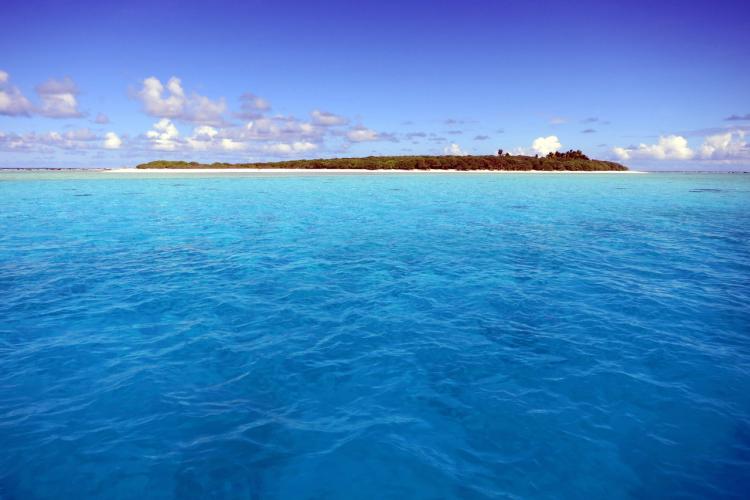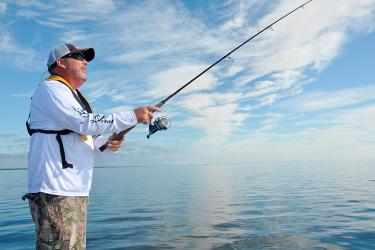The Need for Action
The Pacific Islands are expected to see increased ocean temperatures, rising sea levels, increased ocean acidity, lower ocean productivity, and changes in ocean currents, weather patterns, and extreme weather. Many of these changes have already been observed and are projected to intensify further. Ecosystems and communities will be impacted by these changes in many ways. Decision-makers need information on the timing, nature, and magnitude of climate-related impacts to this region's valuable marine resources.
What's at Risk?
The seafood industry in the Pacific plays an essential role in the U.S. economy by providing more than $100 million dollars in annual landings revenue and thousands of jobs (Fisheries Economics of the United States). Climate change is projected to reduce the Hawaii-based longline fishery's yield by up to 50% by the end of the century, resulting in a loss of food and economic resources.
Coral reef ecosystems are stressed by both increasing ocean temperatures and increasing ocean acidification. Loss of coral reef habitat negatively impacts both coral reef ecosystems and the humans who depend on them. Low islands are facing rising sea levels, resulting in the loss of coastal habitat for humans as well as sea turtles, seabirds, and Hawaiian monk seals. Rising sea levels are also resulting in saltwater intrusion, threatening freshwater and agriculture.

Action Plans
Across the nation, we are working to build the scientific foundation to reduce impacts, mitigate risk, and increase resilience to changing oceans. The Pacific Islands Regional Action Plan is one of five Regional Action Plans that guide implementation of the national climate science strategy in each region for the next five years. Specifically, the plans identify actions to address information needs that the Fishery Management Councils and many other partners and stakeholders determined as top priorities. Implementing these plans will provide managers with the timely information needed to protect and conserve our valuable marine resources.

Goal and Objectives
The goal of the plan is to increase the production, delivery, and use of climate-related information to help reduce impacts and increase resilience of the region’s living marine resources and resource-dependent communities.
Objective 1: Identify climate-informed reference points
- Incorporate climate data into bottomfish and billfish stock assessments
- Begin incorporating climate impacts in coral reef annual catch limits
- More fully address climate impacts on fishery and protected species reference points
Objective 2: Create robust management strategies for a changing climate
- Conduct management strategy evaluations to identify strategies that are robust under climate change scenarios
- Incorporate climate information into Fishery Ecosystem Plans
Objective 3: Incorporate adaptive decision processes
- Design adaptive decision processes for management
- Incorporate climate information into management designations of protected species critical habitat and recovery planning
Objective 4: Project future conditions
- Describe projected oceanographic impacts from climate change
- Conduct coral reef and fish vulnerability assessments
- Project impacts of climate change on fishery yield, ecosystem structure, and fishing communities
Objective 5: Understand how things are changing and why
- Initiate laboratory and field studies to determine mechanisms linking environmental change and ecosystem response
- Develop economic models to assess trip costs and fisher participation under future climate conditions
- Build physiologically-based models to understand climate impacts on protected species
Objective 6: Track changes and provide early warnings
- Continue living marine resource assessments and ecosystem monitoring
- Develop and track climate indices for Council’s annual reports
Objective 7: Build our science infrastructure
- Expand monitoring of climate impacts on key ecosystems, species, and habitats
- Participate in local, national, and international trainings, workshops, working groups, and conferences
- Regularly publish climate and ecosystem research
Moving Forward
The plan would not succeed and provide useful information without partnerships. We continue to collaborate with stakeholders to acquire scientific data and form strategies that will sustain fisheries, healthy ecosystems, and coastal communities in the Pacific Islands. The challenges are great, the issues are complex, and resources are limited. By working together, we can reduce the impacts of changing climate on fisheries, coral reefs, and protected species.
Updates
2018 Annual Collaborative Climate Science Workshop in the Pacific Islands
2017 Annual Collaborative Climate Science Workshop in the Pacific Islands





